Product Review: Wilson Audio WATT/Puppy Speakers
Here is a review of the WATT/Puppy Speakers by Edgar Kramer of SoundStage! Australia:
(Source: soundstageaustralia.com)
The concept of evolution can be simply described as the gradual change in constitution, or characteristics, of a species, an entity, an object, etc., across generations. Darwinism goes a step further and suggests the process comes about by natural selection where small, inherited variations, or adaptations, provide an increased aptitude to successfully compete and thrive. So it is with the new Wilson Audio The WATT/Puppy, which celebrates its 50th anniversary after a near-15-year hiatus under that moniker. In this evolutionary transmutation, the latest WATT/Puppy embodies Wilson Audio’s entire current philosophies and peak technologies, once again, elevating the compelling concept.
A Classic… Advanced
Since its inception 50 years ago, the WATT/Puppy has been refined through eight generations, with the System 8 being the last iteration to wear the WATT/Puppy badge, back in 2009. This writer owned and truly enjoyed several of those iterations, beginning with the WATT/Puppy 5.1, moving to the Series 6 and culminating with the final Series 8. Each model unquestionably improved on many of the qualities of its predecessor by adopting Wilson Audio’s tech progress as introduced on upper-tier models. In other words, the concept was one of constant, successful evolution from generation to generation… as it should be, given the company’s standing in a high-end audio market which demands highly engineered products.
As per the widely known lore, David Wilson designed the WATT in the mid-80s as a portable location monitor of the highest quality. The WATT was meant to be a precision tool which would provide meticulous discernment of characteristics inherent in Wilson’s in-venue recordings.
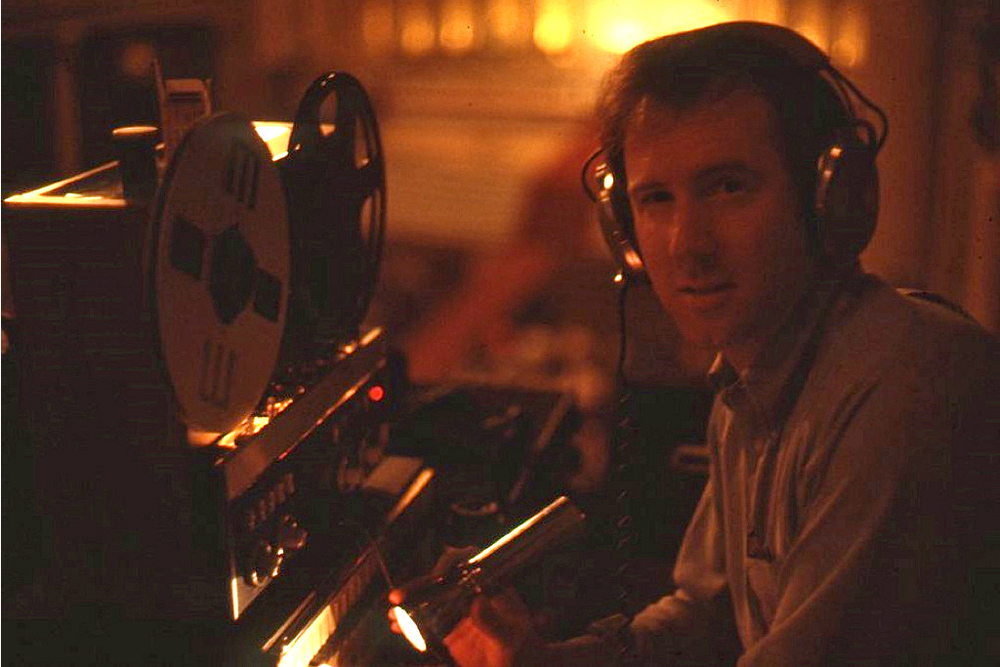
Such was the excellence of the tank-solid WATT that those who experienced its exceptional performance wanted them. Things escalated well beyond David Wilson’s own personal requirements, to the point that market demand made it viable for David and Sheryl-Lee Wilson to launch Wilson Audio as a loudspeaker manufacturing concern. The rest, as they say, is history.
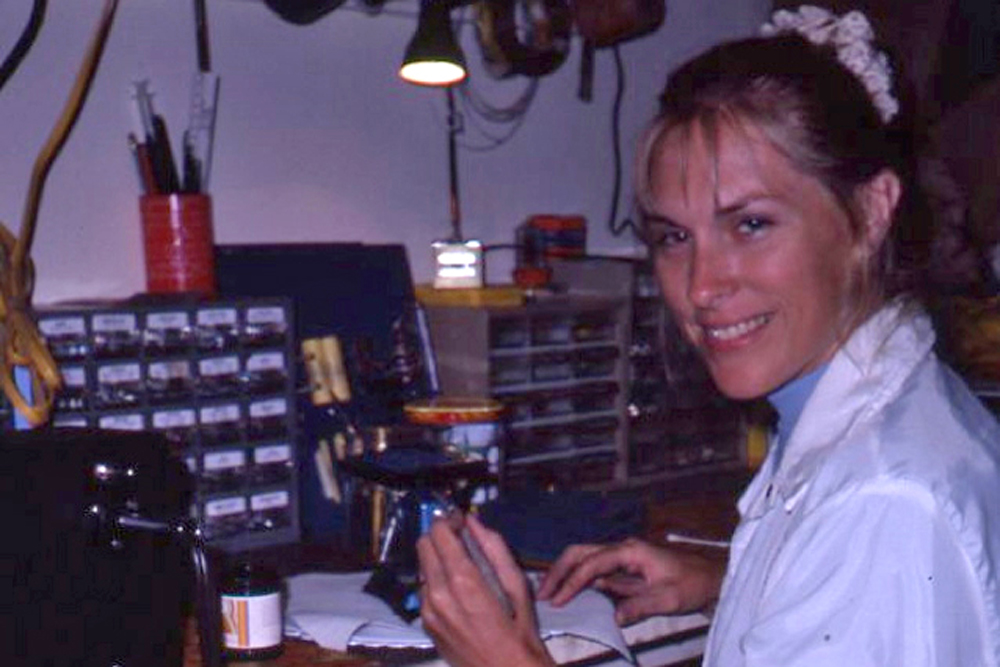
The new The WATT/Puppy returns from its hiatus, with the concept now leap-frogging itself by inheriting Wilson Audio’s latest cabinet materials, drivers and crossover technologies.
Let’s begin with the cabinet materials employed across the dual-module WATT/Puppy which, of course, features a pyramid-shaped cabinet (the WATT) which sits atop a larger bass module (the Puppy). The WATT cabinet architecture features S-Material (introduced in Sasha Series 1) where the new QuadraMag midrange driver couples to the front baffle and M-Material and X-Material across other panels. The relatively new V-Material is used on the Puppy’s top panel where it serves as a vibration “sink” and damping interface for the WATT. Again, X-Material is used across the Puppy for bracing and overall enclosure strengthening. Every aspect of the materials application is designed to strategically minimise vibrational distortions.
For the 50th Anniversary WATT/Puppy, Wilson Audio employs its latest driver developments. The high frequencies are handled by the highly regarded Convergent Synergy Carbon (CSC) 25 mm coated textile dome tweeter, first developed for the Alexx V and subsequently also employed on Alexia V and Sasha V. The tweeter is mounted in its own sealed enclosure and features an in-house 3D-printed rear chamber. The chamber’s complex pattern design is said to eliminate back wave reflections resulting in a more linear high frequency response.
The crucial midrange sees the implementation of the QuadraMag 180 mm paper diaphragm midrange driver as used across all the models above The WATT/Puppy, right up to XVX Chronosonic. The cone features a series of radial score marks (also ‘sliced’ across its dome dust cap) which are said to effectively reduce cone break-up. The driver’s motor system array employs four powerful AlNiCo (Aluminium/Nickel/Cobalt) magnets. Across its implementations, the QuadraMag midrange is renowned for its tonal accuracy, fast transient response, and “sonic beauty and bloom”. As per other speakers in the Wilson Audio line-up, the WATT’s upper rear panel features a slot port for the QuadraMag driver.
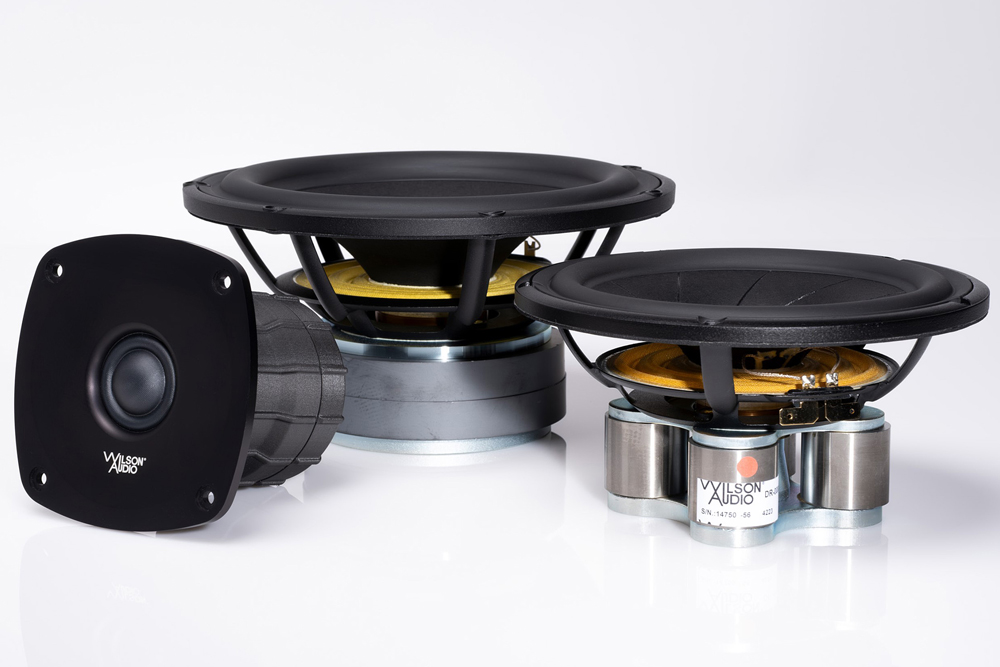
Of course, as per the original, the Puppy houses two 200 mm “formed homogenous cellulose composite” high-power, low frequency drivers. These woofers are the same drivers used in Sasha V’s bass module. The Puppy has its own large, centrally-mounted machined steel bespoke reflex port (no off-the-shelf plastic ports here), sporting a flared exit in order to reduce air movement noise (or ‘chuffing’), which can come about as a result of the woofers’ high excursion capabilities.
New on the Puppy bass module is an integrated bubble level which makes the process of accurately levelling the speakers a conveniently easy task. The WATT/Puppy is provided with Wilson Audio’s standard spike diodes and can be upgraded with the very effective, V-Material-loaded Acoustic Diodes.
Wilson Audio has redesigned the crossover network with its own, in-house manufactured, AudioCapX-WA low inductance copper capacitors featuring “copper end-sprays” and gold leads. As per Wilson Audio custom, the network is point-to-point wired and is encapsulated within a dedicated enclosure in order to minimise vibrational influences.
In line with its upper-range stablemates, the crossover networks’ resistors are displayed within a carbon fibre-backed panel on the rear of the cabinet. This allows easy access to the high quality tweeter and midrange resistors which can be replaced by simply disengaging gold plated thumbscrew connectors. The panel is protected with an aluminium-framed glass cover. In celebration, a limited-to-2024 commemorative plaque, or medallion, sits centrally between the two resistor banks, marking this version of the WATT/Puppy as the 50th Anniversary model. The 1974 to 2024 ‘Authentic Excellence’ medallion is set to match the colour of the metal hardware chosen, whether natural silver or black, while WATT/Puppy speakers ordered in red paint finishes will feature a matching red medallion.
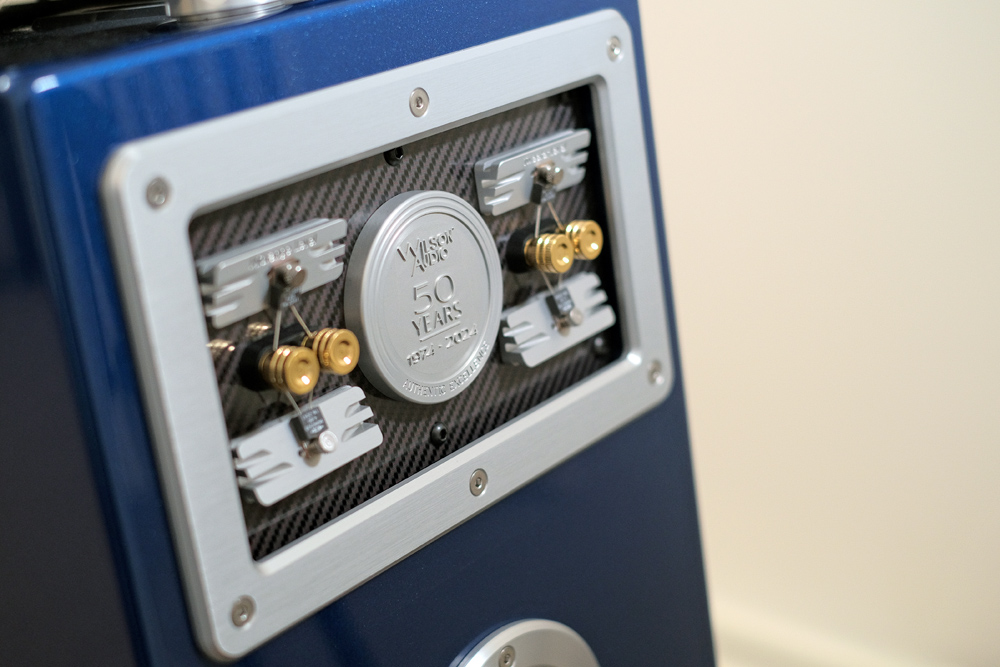
As mentioned above, David Wilson designed the original WATT to be a location monitor for Wilson Audio label’s recording sessions. In order to facilitate its transportation, the heavy-for-its-size WATT incorporated a steel rod, which transversed from lateral cabinet wings across its rear panel, effectively serving as a carry handle. The new WATT/Puppy features a freshly designed, more ergonomically contoured handlebar making it easy to manoeuvre the cabinet for placement on the Puppy’s top panel (and yes, or even for transporting to recording locations).
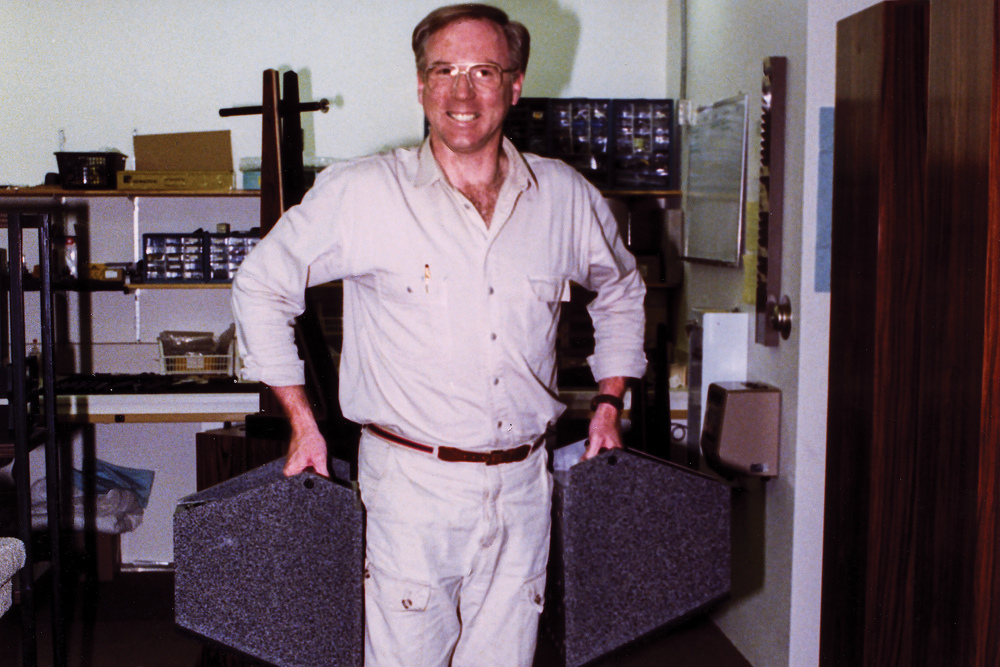
The WATT/Puppy features Wilson Audio designed speaker binding posts which are easily tightened/loosened with the provided US-made spanner, one of the several items included in The WATT/Puppy tool kit. The binding posts, both on WATT and on Puppy, are mounted on brushed aluminium panels, and can accept banana and spade connectors. The crossover network is housed within the enclosure of the Puppy bass module. The WATT connects to the Puppy via a set of crossover network cables which extend up from the latter’s top panel. The cables are somewhat adjustable, in terms of length, via either pulling for extending or pushing into the Puppy to shorten. Once adjusted, the cables can be locked in position with machined metal grip rings.
Wilson Audio specifies the WATT/Puppy’s frequency response as spanning from 26 Hz to 30 kHz at +/- 3 dB given as a ‘Room Average Response’ (RAR). The system’s nominal impedance is 4 ohms, with a minimum point of 2.87 ohms at 86 Hz. Overall sensitivity is quoted as 89 dB/1 Watt/1m at 1 kHz. Wilson Audio recommends a minimum amplifier power rating of 25 watts per channel.
The review sample was provided in an absolutely stunning ‘Mediterranean Blue’ gloss finish, subtly highlighted with a generous smattering of speckling, like glimmering stars across azure waters…
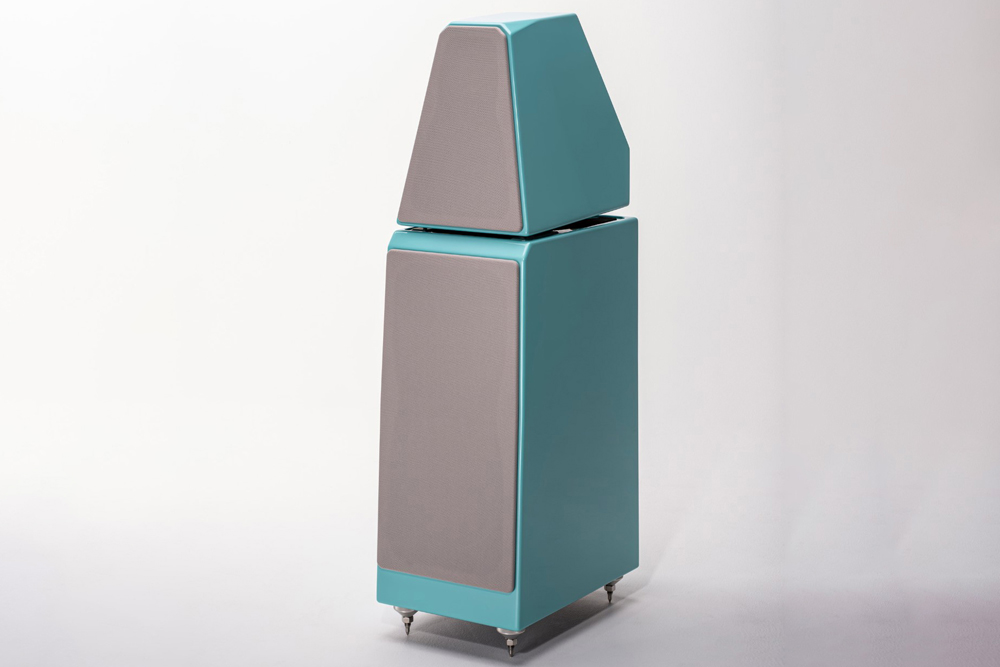
The metal hardware – meaning the parts around the binding posts, the reflex port, etc. – in this configuration came in natural silver and is also available in black. While the standard colour is black, the protective grilles were provided in a dark blue tone to match the finish. Wilson Audio offers a reasonably wide spectrum of optional finishes for both the cabinets and the protective grilles. Overall construction, paint finish, metalwork and general hardware quality is, as always from Wilson Audio, second to none.
Hero’s Saga
When compared to the preferred location for my reference Alexia V, The WATT/Puppy’s position in my room ended up being about two or so inches closer to the wall behind. Speaker-to-speaker spread was roughly the same, give or take a quarter of an inch. That’s the general vicinity where most speakers work well, in this room, for low frequency integration and in terms of neutrality across the midrange and upper frequencies.
Once positioned optimally, through my early listening, I immediately detected the somewhat different presentation when compared to Alexia V. I found this quite interesting, considering the use of the same tweeter and midrange drivers, the same cabinet materials and, what I’d have to assume are, generally speaking, very similar crossover components (aside from the bespoke WATT/Puppy-dedicated capacitors). Granted, the woofer drivers’ different dimensions, and the much smaller bass module cabinet were bound to have The WATT/Puppy outputting a comparatively diminished low frequency when compared to Alexia V and, therefore as a result, there’s a slighter sense of dynamic scale through the bass bandwidth.
However, while that was the case – although to a lesser extent than I was expecting due to The WATT/Puppy’s prodigious bass performance – I found the biggest variations between these two phenomenal designs came from the upper bass right up to the high frequencies.
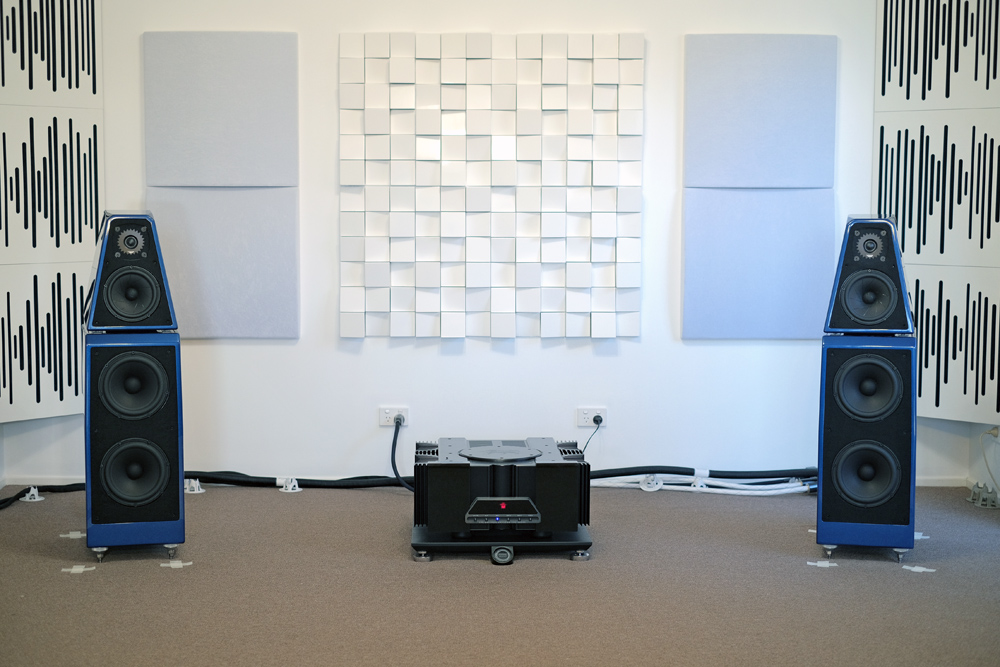
On the song “Red And Black Light”, from the superb 10 Ans De Live! live performance compilation across a number of venues, by trumpeter and composer (also accomplished pianist) Ibrahim Maalouf, the acoustic spaciousness and ambience of the Zénith Nantes Métropole venue in Nantes, France came across in all its vastness. The track is epic, starting with delicate piano, then building to multiple chaotic crescendos creviced by moments of crowd participation and softer melodies.
The WATT/Puppy was remarkably skilled at making the large venue a sonic apparition within my listening space. I was there, with the crowd, vividly almost living and feeling the undulating waves of the audience’s collective singing. When the full orchestra kicks in, there’s tremendous control, especially in the well-recorded bass (the very subtle upper bass emphasis makes all so enjoyable), where The WATT/Puppy was capable of launching exceptionally powerful low-frequency energy pulses into the room. Through Maalouf’s trumpet solo, the delicacy, tonal texture, the detail of breath-through-pipe were amazingly realistic. I recommend also searching for this mesmerising track on YouTube; look for this very same live version to see what the concert was like.
Take either the track “Messenger” or the title track from cool-pop band Blonde Redhead on their album Misery Is a Butterfly. The WATT/Puppy projected Kazu Makino’s vocals a tad forward of the speaker plane, while behind her the backing keyboards, guitar, and percussion were rendered with exceptional detail and super-precise separation. Each instrument and musical strand lived in its own space while also forming the make-up of the music.
This is a speaker which can dissect the most complex of mixes, just like a superhero studio monitor but, unlike what can often be soulless scalpel-like instruments, sometimes even bluntly so, The WATT/Puppy preserves the spirit of the music, just like the artist would intend… no, I’d say the artist would demand.
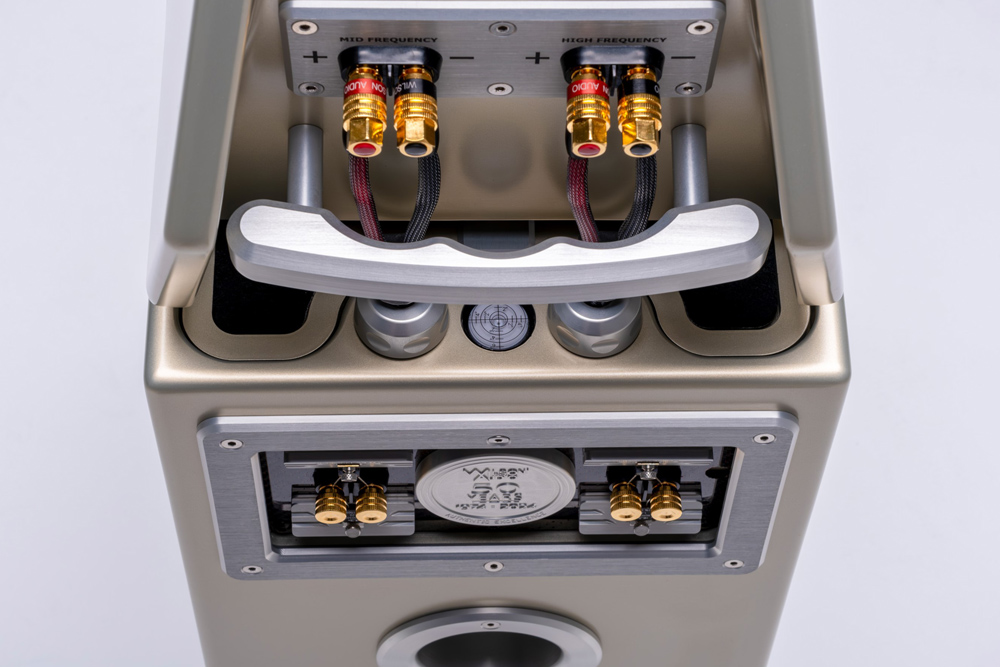
Through my go-to live performance recordings, The WATT/Puppy championed the ability to project a tremendously generous soundfield. Most notably, certain instruments, recording permitting of course, imaged laterally beyond the speakers’ locations. I wondered what sonic vistas would open up if my room was wider than 4 m, but then again, the enormous width in my room may be a product of the well-treated side walls. On more than one occasion, I was taken aback by sounds coming from what seemed like places beyond the walls. The same applied to the depth perspective, although not quite to the same levels of sheer dimensionality as presented by Alexia V, especially in terms of image height (Alexia V is a much taller speaker, after all). However, in my experience for a speaker of its size, and even up against larger designs, The WATT/Puppy is without peer.
One of the many quintessential properties of the WATT/Puppy through the generations was the ability to reproduce outstanding dynamic expression. The 50th Anniversary The WATT/Puppy retains the trait with dynamic contrast capabilities that seem… unhindered. Yet it’s always a controlled maelstrom. There’s an effortlessly managed headroom, evidenced in the oscillation between near-silent pianissimo and extreme fortissimo.
This is further enhanced by The WATT/Puppy’s ability to handle fast transients with assured attack. The tension of fast acoustic guitar, the sharp crack of well-recorded snare drum, the rhythmic swing and bounce of electric or acoustic bass, the propulsive push of kick and tom-tom drums, all of those are offered at superbly controlled, expressive and nuanced levels. For this writer, all of those qualities, in addition to the complete The WATT/Puppy presentation, add up to pure, captivating engagement.
Playing A Perfect Circle’s “The Noose” from the album Thirteenth Step was a knock-your-socks-off experience via the WATT/Puppy. The track starts quite low-fi and softly muffled, then opening up with a superbly-recorded cracking snare, slamming tom-tom drum, subtle guitars and background atmospheric sounds in support of Maynard James Keenan’s mellow vocals. Then, a few minutes in, it all explodes in a mountainous, chaotic, pinned-to-the-chair eruption. The WATT/Puppy did not falter, not a bead of electromagnetic perspiration on its dome, cone, or glossy surface. That, was as stimulating an experience as I’ve had listening to audio.
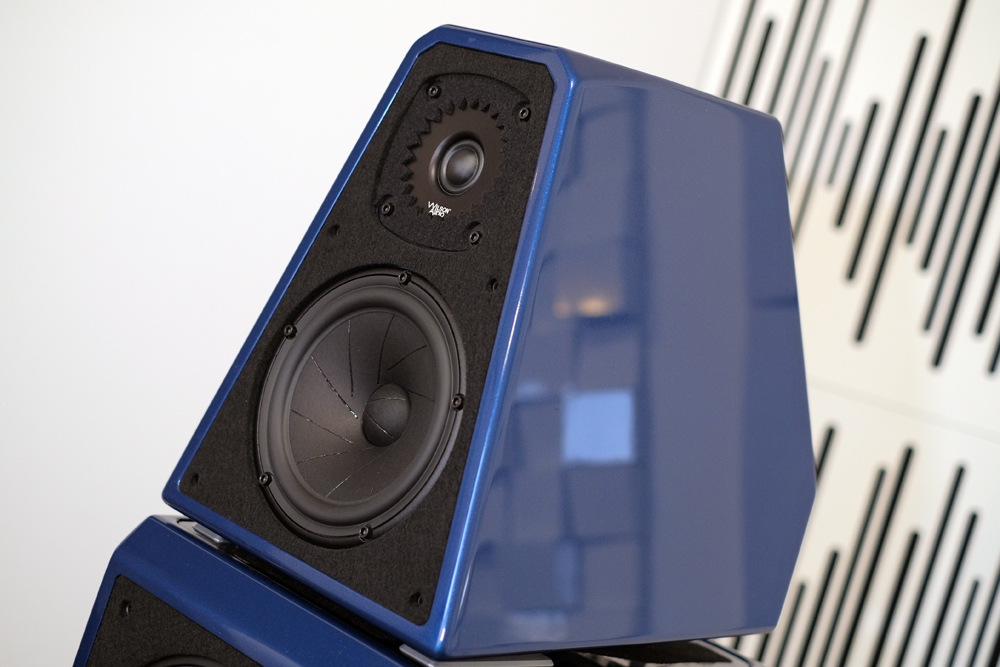
On softer, more tonally incisive material, I was super impressed with the timbrel accuracy of the speakers as they reproduced the delicacy of piano. On Mercury Living Presence’s classic Prokofiev and Rachmaninoff piano concertos, a compilation of recordings conducted in Moscow, Prokofiev’s Toccata in D Minor, Opus 11, Byron Janis’ enthused and subtle-all-at-once solo piece was staggeringly well reproduced, with the massive scale of the instrument and the maestro’s artistry precisely rendered. The following track, Schuman’s “Quasi Variazioni”, a more subdued piece, showed The WATT/Puppy’s capabilities in terms of delicacy with understated resolution. The keys’ percussive nature, the tonal result of hammer felt on metal string across the entire keyboard span, were intoxicating. Really exceptional high-end audio playback here in faithful service of the music.
I challenge the listener to not be moved by the quiet beauty of “Merry Christmas Mr. Lawrence” from Deutsche Grammophon Encore Edition’s Piano Book, a compilation of favourites by pianist Lang Lang. The track swings between almost silent-note-stillness and a cascading torrent of emotion from the compelling crescendo, the span of music mirroring the film’s powerful last scene. Outstanding.
Thrilling moments were also offered by The WATT/Puppy with large orchestral compositions. One of my favourites, Dvořák’s Symphony No. 8 with my dear passed-on uncle Sergiu Comissiona conducting the Houston Symphony Orchestra, “Allegretto Grazioso” portrayed the orchestra’s entire span of instruments with lifelike precision on their individual tonal signatures. Through the more complex segments, the speakers separated the music expertly, maintaining the ability to recognise the sections and instruments being highlighted while retaining the composition’s overall musical integrity. The soundstage spread was also remarkable in its sheer dimensionality.
I’ve been digging Ahmad Jamal’s Saturday Morning album for its excellent music and equally great production quality. The jazz pianist always surrounds himself with top-tier musicians and the result is stunning music. Isn’t it amazing when great music and superb sound are combined? On “Firefly” the recording exposes how the band just totally swings along with Jamal’s signature jazz style. The WATT/Puppy just bopped along making music. The instruments were both homogenised through the music’s construct and melody, while also being precisely individualised as independent virtuosic threads. The acoustic bass was rounded and deep with snappy punch, the drums propelled the music and Jamal… just rocked. It’s with these acoustic instruments that the phenomenal tonal truth is communicated via The WATT/Puppy.
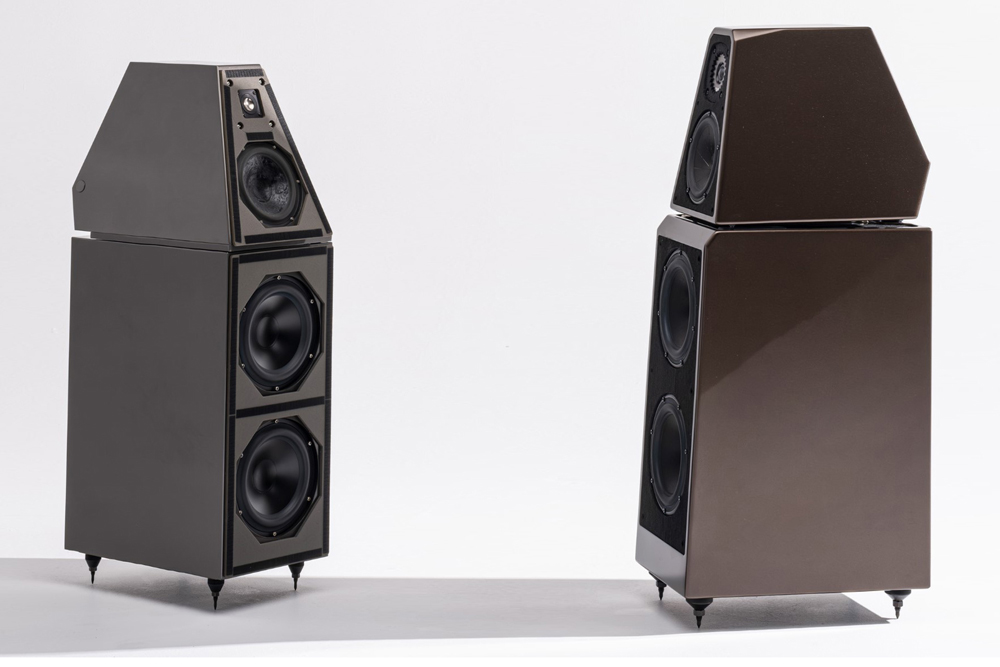
Regarding The WATT/Puppy’s bass performance, it differs from Alexia V by pushing the mid-to-upper-bass very marginally more forward while being slightly lighter way down low. As you’d expect from a smaller speaker design with twin 200mm woofers as opposed to 200mm and 250mm woofers in a substantially larger bass cabinet. Significantly, however, the result is a superbly satisfying bottom end which is always tight, rhythmic and, frankly, representative of the real thing in all but the most imperial rooms. In addition, the Wilson Audio engineering team has expertly designed The WATT/Puppy to, at the end of the day, just cohere across the entire frequency bandwidth.
That includes a smooth treble range too, where detail is presented with revealing accuracy, yet without ever sounding etched or bright. Ditto for the midrange, which has a natural, convincing presence across male and female vocals which are always sharply focused and occupy realistically-sized spaces within the soundfield.
The WATT/Puppy just controls the music, is superbly balanced and, yes, it’s musical. That term is often derided by many objectivists, yet, when an audio system engages and presents music in such an engaging way, when it transports you closer to a live performance, then musical is the word that, simply, best describes the outcome.
In fact, for me, a key aspect of the “outcome” is how I felt when listening to WATT/Puppy. Every listening session a ‘lost time’ experience, ghostly hours passing… unnoticed and muted by my total engagement. Yes, the new The WATT/Puppy is a bard, an orator delivering an absolute connection with the art of music.
Conclusion
While it’s true that The WATT/Puppy has gone through a period of hibernation – at least as far as the famous name if not the evolution of the concept – I know for a fact that the Wilson Audio engineers took this celebratory 50th Anniversary design through an extended gestation period of detailed analysis. Every aspect of the original and its subsequent generations were re-evaluated. Once the format reached its final architectural advancement, then began the task of amalgamation with the company’s latest driver and cabinet material technologies. Finally, The WATT/Puppy was then constructed and finished to the current hyper-elevated Wilson Audio standards.
For more fascinating insights into The WATT/Puppy 50th Anniversary’s design process, go to my SoundStage! Talks interview with Daryl Wilson (link here).
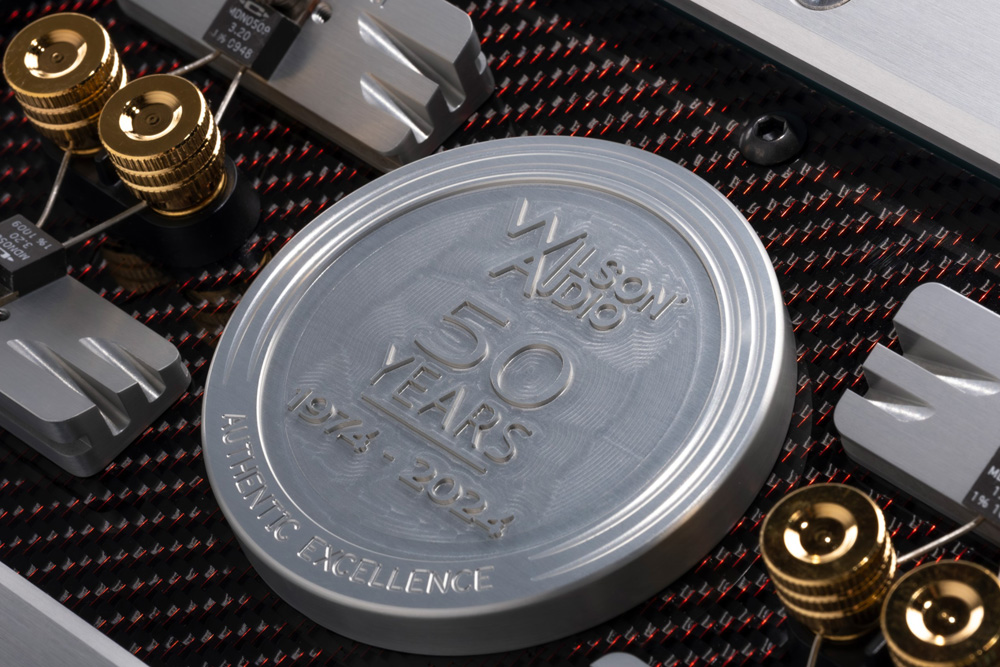
In my opinion, The WATT/Puppy is the new sweet spot in Wilson Audio’s line-up. Hands-down, it surpasses the vast and widely-acclaimed merits of the company’s products down-tier. It also vigorously manifests many of the virtues of the models up the chain. The WATT/Puppy speaker is here now, evidently signalling that in its 50th Anniversary manifestation and going forward, it’s an exceptionally convincing re-interpretation surpassing all before it.
Yes, when it comes to the new The WATT/Puppy, my last words are: Icon Reborn, Hero Destined.
… Edgar Kramer
edkramer@soundstageaustralia.com
Associated Equipment
- Speakers— Wilson Audio Alexia V, Axis Loudspeakers VoiceBox S (nearfield monitor), Vermouth Audio Little Luccas Mk.II, Atacama stands
- Amplifier— Gryphon Audio Antileon EVO
- Preamplifier— Supratek Cortese, Totaldac d1-triunity (periodically, direct to amplifier)
- Sources— Digital:432 EVO Aeon Mk.3 Reference Music Server/Roon Core, Yamaha CD-S2100 transport, Totaldac d1-triunity DAC. Analogue: Transrotor Crescendo with Konstant Studio controller, Reed 1X Tonearm with upgraded internal wiring, Shelter Harmony cartridge, The Funk Firm Houdini cartridge decoupler, Supratek Cortese & REDGUM Audio RGPH2 phono stages
- Processor — DEQX PreMate (part of arsenal/casual use)
- Cables — VYDA Laboratories Orion Silver Reference HFC IC and speaker cables, PSC Audio custom design XLR, Vermouth Audio Reference loom,Tubulus Concentus USB
- Audio Rack — SGR Audio Statement Model V, Aspire Audio Belgravia amplifier platform (customised for Gryphon Audio Antileon EVO), Stereotech Aluminar Dark 3-tier rack
- Acoustic Treatment — Vicoustic Multifuser Wood, Wavewood Ultra, Cinema Round Premium and Super Bass Extreme
- Miscellaneous — Silent Angel Bonn N8 Pro network switch, GigaWatt PF-1 EVO power strip, Les Davis Audio Viscoelastic CLD discs, Voodoo Cable Iso-Pods, Bocchino Audio Mecado, VRC Vinyl Record Cleaning systemplus miscellaneous accessories
Wilson Audio The WATT/Puppy Loudspeakers
Price: AU$66,995
Australian Warranty: Five Years










